英语七年级上册牛津版Unit 4 第4课时-听说
Aunit4Reading课件(含听力)江苏省牛津译林版七年级上册
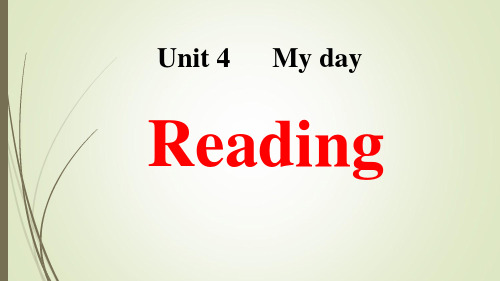
知识点4 •chat /tʃæ t/ vi.& n. 聊天,闲谈
•e.g. A boy and a girl are chatting over there.一个男孩和一个女孩正在那边聊天。
• 拓展:chat 还可以作名词,意为“聊天,闲谈”,固定结 构have a chat with sb.“和某人聊天/ 闲谈”。
•e.g. My mother is very nice to my grandmother.
chat 的常用搭配:
• 我妈妈对我奶奶很好。① chat with sb.和某人聊天
② chat about sth.闲谈某事
• ④After class, we often chat with each other or play in the playground.
• ③They are all nice to me.
类似:be friendly to sb. 对某人
知识点3 •be nice to... 对……好 友好 •be nice to 相当于be good to,其中to 是介词,后 面一般接表示人的名词或代词,即be nice to sb.“对 某人好”。
•e.g. The teacher wants to have a chat with my
father.老师想和我爸爸谈谈。
第三人称单数形式为chats , -ing形式为chatting
知识点5 •each other 相互,彼此 •each other 强调两者之间的相互关系,通常放在动 词或介词后作宾语。
Now I am a student at Sunshine Middle School. I love my school.
2017-2018学年牛津沪教版初中英语七年级英语上册Unit4公开课课件Listening
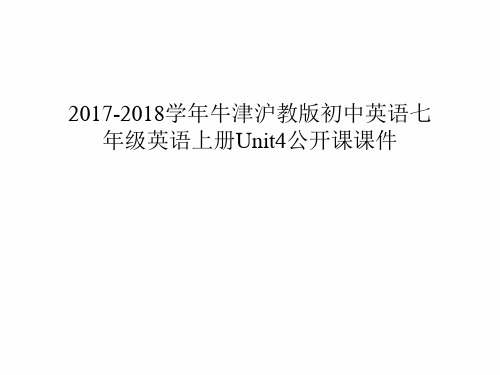
Listening
The weather in Canberra
This is Australia _________. Canberra _________ is a city in the south of Australia.
Top tip When you listen to kelly talking about the weather, you need to catch the important words about seasons amd pay attention to :
(1)
Weather
(2)
Spring September Summer __________ December Autumn March Winter __________ June
(7)
(3)
November warm __________ _____, rainy
February
(4)
dry _______, hot sunny ______, dry
What are the differences between the four seasons in China and those in Australia?
To preview Grammar on Page 49 To learn about the usage of
adjective
(8)
(5)
May __________
(6)
August
very _______ cold
Ask and answer
In pairs, ask and answer the following questions.
Unit4知识点 牛津译林版英语七年级上册

7AU4知识点New words and expressions:1.wake up.He wakes up at six o’clock.1.He wakes her up at seven o’clock.2/Shall we go fishing this afternoon?OK/Good idea! That’s all right. (No,let’s go shopping.3.He seldom goes out.He’s never late for school.4.She has breakfast/lunch/dinner.5.I need to go home early6.have a good rest7.have fun/have a good (great) time (in) doing sth.I have fun playing football8.have lessons/have an English lesson.9.after-school activities10.do one’s homeworkHe does his homework/We do our homework.He doesn’t do his homework./Does he do his homework?11.go to bed. He goes to bed at 9/He gets up at six .12.be late for He is late for school/the meeting.13.The meeting/Our school starts at 8 o’clock.14.a quarter past six/seven half past eight15.at six in th emorning/afternoon16.play football first.17.chat with him/her chat with each other18.learn from each other/ help each other19wish best wishes wish you successWish your team good luck.20.would like to go shopping.Would you like to go shopping this afternoo ?21.save my life---save their lives.22.go to the museum.23twice a week/once a year. How often does he go home?24.go on a picnic=go on picnics25.dislike playing games27.get ready for th eparty/th emeeting.28.learn a lot about the worldLanguage points: 1.It’s time for breakfast=It’s time to have breakfast2.Shall we go running/walking in the hill?3.I seldom go out /play games.4.After sleep I sleep.5.nad a good rest/He needs some milk.6.I don’t know how to have fun/what to do /how to do it/where to go7.What time do you strat lessons?8enjoy myself/enjoy working in Beijing/living in Shanghai.9.talk about playing games.10.from Monday to Friday—five days a week.11.Our lessons begin at 8:15.12.My favourite subject is English/sport is swimming.13.a lot of friends—lots of /many14.They are all nice(kind) to us---All of them are nice to us.15.a Reading Club16.read books/borrow books from the library.17.I also like playing volleyball.18.I’m in the school volleyball team=I’m a member of the school team.19.on Wednesday afternoon20.in the evening/in March/in winter/in 2202/in 2012.321.on Saturday/on 1 July/on Sunday morning/on Children’s Dayon a cold morningo/ on the afternoon of September 122.at seven o’clock/at 6 years old/at Christmas23.Thanks for your e-mail/giving me a pen/helping us with our English.24.tell you about my life/tell us about your school.25.I’m good at playing football=I play footballwell.26.He often plays football in the playground.27.She doesn’t have lunch time to play tennisShe has atime to sing.28.She’s a member of th eswimming team.She usually swims after school.29.He never plays basketball.30.He goes to her dancing lessons.31.She always dances for half an hour.32.She sometimes goes roller skating.33.Saturday ,7 November.34.Welcome to our schol/our school football match.35.There’s a volleyball match between A and B.36.He goes there by bus.37.I hope everyone can come and watch the game.38Wish our team good luck.39.What do you like to do at weekends?40.How often do you visit the Great Wall.Twice a month41.Morning exercises are good fo rus.42.Reading in th esun is bad for your eyes.43.have too much homework to do.44.so I can’t play basketball well.45.It helps me get ready for the day.48.I don’t like singing.49.It’s fun/interesting.。
2024-2025学年牛津译林版七年级英语上册+Unit+4+新版+词汇表讲解
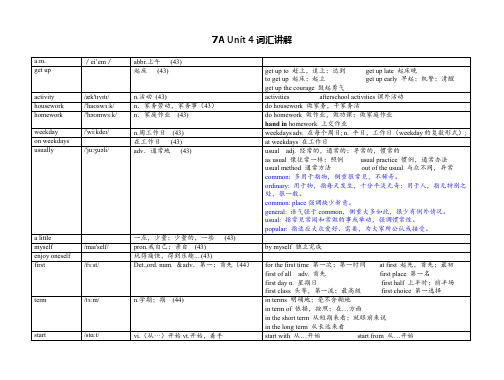
7A Unit 4词汇讲解a.m./ei’em/abbr.上午(43)get up 起床(43)get up to 赶上,追上;达到get up late 起床晚to get up 起床;起立get up early 早起;机警;清醒get up the courage 鼓起勇气activity/æk'tɪvɪtɪ/n.活动(43)activities afterschool activities课外活动housework/'haʊswɜːk/n.家务劳动,家务事(43)do housework 做家务,干家务活homework/'həʊmwɜːk/n.家庭作业(43)do homework 做作业,做功课;做家庭作业hand in homework 上交作业weekday/'wiːkdeɪ/n.周工作日(43)weekdays adv. 在每个周日; n. 平日,工作日((weekday的复数形式); on weekdays 在工作日(43)at weekdays 在工作日usually/'ju:ʒuəli/adv.通常地(43)usual adj. 经常的,通常的;寻常的,惯常的as usual 像往常一样;照例usual practice 惯例,通常办法usual method 通常方法out of the usual 与众不同,异常common: 多用于指物,侧重很常见,不稀奇。
ordinary: 用于物,指每天发生,十分平淡无奇;用于人,指无特别之处,很一般。
common: place强调缺少新意。
general: 语气强于common,侧重大多如此,很少有例外情况。
usual: 指常见常闻和常做的事或举动,强调惯常性。
popular: 指适应大众爱好、需要,为大家所公认或接受。
a little一点,少量;少量的,一些(43)myself/maɪ'self/pron.我自己;亲自(43)by myself 独立完成enjoy oneself玩得痛快,得到乐趣 (43)first/fɜːst/Det.,ord. num. &adv.第一;首先(44)for the first time 第一次;第一时间at first 起先,首先;最初first of all adv. 首先first place 第一名first day n. 星期日first half 上半时;前半场first class 头等,第一流;最高级first choice 第一选择term/tɜːm/n.学期;期(44)in terms 明确地;毫不含糊地in term of 依据,按照;在…方面in the short term 从短期来看;就眼前来说in the long term 从长远来看start /stɑːt/vi.(从···)开始vt.开始,着手start with 从…开始start from 从…开始n.开头,开端(44)at the start 开始at the start of 在…开始的时候start in 开始from the start 从一开始start up v. 开始;发动;突然站起;突然出现start at 开始于…;以…开始;因…吃惊start on v. 开始进行start for 出发,启程;动身去start out 出发;著手进行start off 出发,开始start point 出发点;起始点start doing/ to do sth 开始做某事writer/'raɪtə/n.作家(44)language/ˈlæŋɡwidʒ/n.语言(44)foreign language(s) n. 外语;外文language learning 语言学习second language 第二语言body language 身体语言natural language 自然语言spoken language 口语,口头语言;出声语言common language 共同语;公用语言native language 本国语言;本机语言;机器各单元间编码语言amazing/ə'mezɪŋ/adj.令人大为惊奇的(44)biology/baɪ'ɒlədʒɪ/n.生物学(44)biological adj. 生物学的;生物的living/'lɪvɪŋ/adj.活着的,活的(44)n. 生计;生存;生活living environment 生活环境living room 客厅,起居室living standard 生活水平,生活标准standard of living 生活水平;生活标准living space 生存空间living condition 生活条件;居住环境make a living 谋生,维持生活cost of living 生活费,生活费用for a living 为了生存;为…谋生living thing 生物living level 生活水平earn a living 谋生;活命living habit 生活习惯;生活方式alive: 其反义词为dead,指生命从奄奄一息到精力旺盛的各种状态。
牛津译林版七年级英语上册Unit4-重点词组、难点解析、语法知识点复习
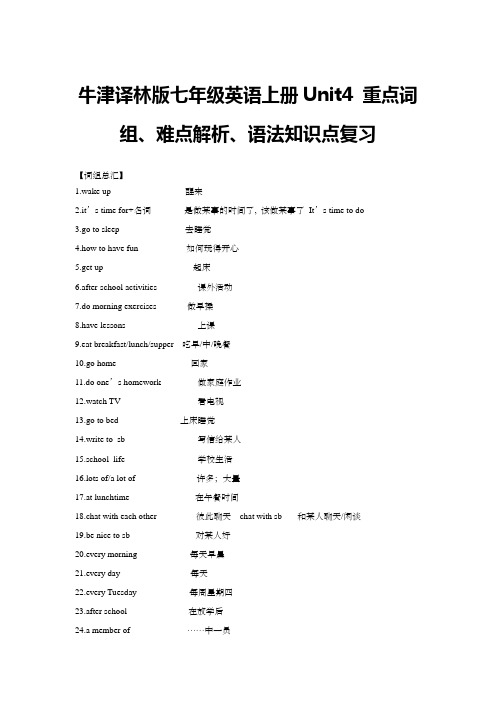
牛津译林版七年级英语上册Unit4 重点词组、难点解析、语法知识点复习【词组总汇】1.wake up 醒来2.it’s time for+名词是做某事的时间了, 该做某事了It’s time to do3.go to sleep 去睡觉4.how to have fun 如何玩得开心5.get up 起床6.after-school activities 课外活动7.do morning exercises 做早操8.have lessons 上课9.eat breakfast/lunch/supper 吃早/中/晚餐10.go home 回家11.do one’s homework 做家庭作业12.watch TV 看电视13.go to bed 上床睡觉14.write to sb 写信给某人15.school life 学校生活16.lots of/a lot of 许多;大量17.at lunchtime 在午餐时间18.chat with each other 彼此聊天chat with sb 和某人聊天/闲谈19.be nice to sb 对某人好20.every morning 每天早晨21.every day 每天22.every Tuesday 每周星期四23.after school 在放学后24.a member of ……中一员25.the Swimming Club 游泳兴趣小组26.have a good time 玩的开心27.email sb 给某人发电子邮件28.play games 玩游戏, 进行比赛29.twice a week 一周两次30.have fun 娱乐,乐趣;开心P.27-3031.listen to the radio 听收音机32.make a model plane 制作模型飞机33.read newspapers 看报read books 看书34.write emails 写邮件35.watch football matches 看球赛36.watch too much TV 看电视太多37.listen to music 听音乐38.listen to the teacher 听老师讲39.walk a dog 遛狗40.a piece of good news 一则好消息41.in the school football team 在学校足球队42.all the time 一直43.know (a lot) about…对……了解(很多)44.read comic books 看连环漫画书45.on the volleyball court 在排球场46.from...to…从……到……47.meet up with sb. 约见某人48.do their homework 做他们的作业49.under a big tree 在大树下50.go to one’s dancing lesson 去上舞蹈课51.have (no) time to do sth. 有(没有)时间做某事52.have a lot of new friends 有许多新朋友53.teach us English 教我们英语54.talk about…谈论关于……55.at home 在家56.say hello to…向……问好P.31-3757.the Class 1,Grade 7 students 七年级一班学生58.go on a trip 旅行, 旅游have one’s trip59.look at the posters 看海报60.more than 多于;超过61.twice a week 一星期两次62.the China Space Museum 中国航空博物馆63.the China Science and Technology Museum 中国科技博物馆64.next Monday 下周一65.each student 每个学生66.thank you for doing sth 为做某事而谢谢你anize the class trip 组织班级旅游68.I would like to+动词原形愿意干某事;想要干某事69.the price for………的价格70.be open/be closed 开着、关着71.look forward to…期盼;盼望72.enjoy…very much 非常喜爱……73.need to do sth 需要做……74.borrow a pen 借一支钢笔75.be busy doing 忙于做某事76.be good for 有益于77.help sb do sth 帮助某人做某事78.get ready for 准备……79.learn more about 更多了解……80.the answer to ………的答案81.the Computer Club 电脑兴趣小组【难点解析】1.Is it time for breakfast? 是吃早餐的时间了吗?it’s time for+名词, “是做某事的时间了, 该做某事了”=it’s time to+动词原形.例如:It’s time for class.是上课的时间了。
七年级上册英语单词听写第四单元带汉语

七年级上册英语单词听写第四单元带汉语Unit 4Part One: Word DictationLesson 1: Family and Friends1. mother [ˈmʌðər] 母亲2. father [ˈfɑːðər] 父亲3. sister [ˈsɪstər] 姐妹4. brother [ˈbrʌðər] 兄弟5. grandmother [ˈɡrænˌmʌðər] 奶奶6. grandfather [ˈɡrænˌfɑːðər] 爷爷7. aunt [ænt] 姑妈/阿姨8. uncle [ˈʌŋkəl] 叔叔9. cousin [ˈkʌzn] 堂兄弟/堂姐妹10. friend [frend] 朋友Lesson 2: The House1. living room [ˈlɪvɪŋ ˌruːm] 客厅2. bedroom [ˈbedˌrum] 卧室3. kitchen [ˈkɪtʃən] 厨房4. bathroom [ˈbæθˌrum] 浴室5. garden [ˈɡɑːrdn] 花园6. stairs [steərz] 楼梯7. garag e [ˈɡærɪdʒ] 车库8. balcony [ˈbælˌkəni] 阳台9. door [dɔːr] 门10. window [ˈwɪndoʊ] 窗户Lesson 3: Daily Routine1. get up [ɡet ʌp] 起床2. have breakfast [hæv ˈbrekfəst] 吃早餐3. go to school [ɡoʊ tu skul] 上学4. have lunch [hæv lʌntʃ] 吃午饭5. do homework [duː ˈhoʊmˌwɜːrk] 做作业6. play games [pleɪɡeɪmz] 玩游戏7. watch TV [wɑtʃ ˈtiːˌviː] 看电视8. go to bed [ɡoʊ tu bed] 上床睡觉9. brush teeth [brʌʃtiθ] 刷牙10. wash face [wɔʃ feɪs] 洗脸Lesson 4: School Life1. classroom [ˈklæsˌrum] 教室2. schoolbag [ˈskulˌbæɡ] 书包3. blackbo ard [ˈblækˌbɔːrd] 黑板4. desk [desk] 课桌5. chair [tʃer] 椅子6. notebook [ˈnoʊtˌbʊk] 笔记本7. textbook [ˈtɛkstˌbʊk] 教科书8. pen [pɛn] 钢笔9. pencil [ˈpɛnsəl] 铅笔10. ruler [ˈruːlər] 尺子Part Two: Sentences Dictation1. My mother is a teacher. - 我的妈妈是一名老师。
七年级英语上册-各课详细练习及答案-译林牛津版
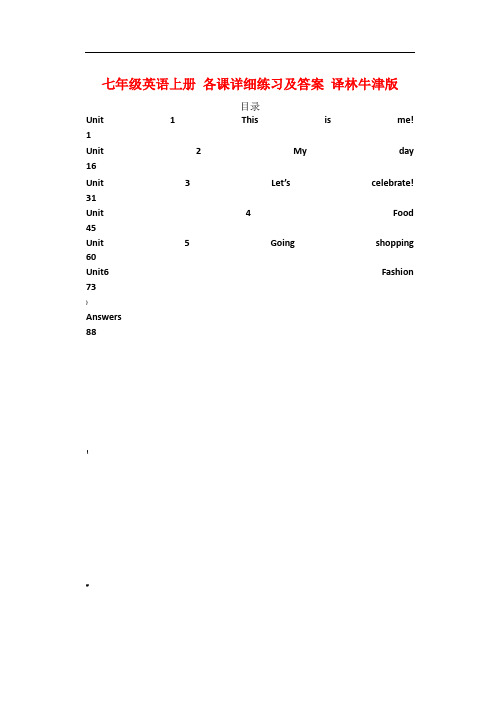
七年级英语上册各课详细练习及答案译林牛津版目录Unit 1 This is me! 1Unit 2 My day 16Unit 3 Let’s celebrate! 31Unit 4 Food 45Unit 5 Going shopping 60Unit6 Fashion 73}Answers88!~{Unit 1 This is me!%Welcome to the unit一、词组翻译:1. 一只电子狗______________2. 我的主人__________________3. 看书_____________________4. 早上好__________________5. 如何照顾Kitty_______________6. 晚上好_________________7. 遇到新朋友____________ 8. 晚安_____________________________ 9. 北京阳光中学_____________________ 10. 他们第一堂英语课__________________二、选择填空:…( )1. This is a very interesting book with lots of new words. Please ______ it carefully.A. lookB. seeC. look atD. read( )2. I really love sports. Can you tell me how ___ like a good swimmerA. swimsB. to swimmingC. to swimD. swimming ( )3. The teacher asks the students to write an article______ the Mid-Autumn Day.A. inB. ofC. aboutD. at( )4. Please introduce yourselves ______ each other.A. toB. withC. andD. about—( )5. Excuse ______, are ______my new classmateA. me, youB. my, yourC. I, youD. me, your( )6. Let’s ______ each other.A. make friendsB. make friends toC. make friend withD. make friends with( )7. — ___________ — My name is Mark.A. Are you MarkB. What’s this in EnglishC. Hello, Mark.D. What’s your name( )8. What ______ your sister’s nameA. areB. doesC. isD. were,( )9. —It’s time to go to bed, Lily! — Ok. ______, Mummy.A. Good morning.B. Good afternoon.C. Good eveningD. Good night( )10. Here is a bag. Could you carry________ for the old manA. itB. itsC. it’sD. them三、动词填空:1. Sandy and Lucy __________ (be) in the same class.2. Do you __________ (know) that girl3. Daniel __________ (wear) glasses every day.、4. Millie often __________ (fly) a kite with her brother.5. She __________ (not like) comic books.6. Does Simon __________ (watch) TV on Saturday7. —Where does he have lunch— He always__________ (have) lunch at school.8. They want __________ (play) table tennis.9. Dave usually __________ (go) running in the morning.10. Cats enjoy __________ (eat) fish.—四、完成对话:(A)L: Hello.M: Hi!L: My name __________ Liu Mei. __________ your nameM: __________ Mike.L: Nice to meet you!M: __________ __________ __________ __________, too.$L: __________ be friends.(B)Joan: Good morning!Ann: __________ __________!Joan: __________ __________ __________Ann: My name is Ann.Joan: Nice to meet you.Ann: __________ __________ __________ __________, __________.@Joan: Welcome to our school.Ann: __________ __________.Reading(1)一、词组翻译:1. 戴眼镜___________2. 喜欢阅读__________________________3. 读书俱乐部__________________4. 喜欢跳舞___________________5. 努力学习_______________6. 喜欢玩电脑游戏____________________7. 擅长游泳_______________8. 出生于____________________________ -9. 居住在苏州______________ 10.来自北京__________________________二、根据句意和汉语注释,在空格内写出各单词的正确形式:1. His father is a kind man. He is very __________(乐于助人)can find Millie in the__________(阅读)room.3. Do you want __________(居住)in Shanghai4. She __________(有)black hair and big eyes.5. Mary enjoys __________(游泳)in summer.6. He is a __________(有趣)boy. We all like him.^7. Are you good at __________(跳舞)8. I was __________(出生)in Shanghai.9. The man with __________(眼镜)is my English teacher.10. We are __________(主人)of our country.三、选择填空:( )1. Where ______ my glasses I can’t find______.A.is, itB. does, itC. are, themD. do, them( )2. My cousin is ______.。
牛津深圳初中英语七年级上册Unit 4《Seasons Listening》精品课件

What are the differences between the four seasons in China and those in Australia?
最新初中英语精品课件设计
To preview Grammar on Page 49 To learn about the usage of
adjective
最新初中英语精品课件设计
Reading the pictures first. The pictures usually tells you the kinds of things to listen for.
Writing down the relevant (相关的) information quickly.
最新初中英语精品课件设计
A. Listen to Kelly talking about the
weather and put the photos below in the
correct order.
a
b
1
Байду номын сангаас
2
c
d
4 最新初中英语精品课件设计
3
Listen again and complete the table below.
最新初中英语精品课件设计
Listening
The weather in Canberra This is A__u_s_t_r_a_l_ia_.
C__a_n_b__e_r_ra_ is a city in the
south of Australia.
最新初中英语精品课件设计
Top tip
When you listen to kelly talking about the weather, you need to catch the important words about seasons amd pay attention to :
Unit4知识点梳理牛津译林版七年级英语上册

牛津译林版七上Unit 4 知识点梳理1.Wake up, Eddie. 醒醒,埃迪。
wake up:“醒来”。
“唤醒某人”:如果所接宾语是人称代词,只能放在wake和up中间;如果所接宾语是名词,放在up、前后均可。
awake:adj.“醒着的”。
2.Is it time fro breakfast? 到吃早饭的时间了吗?It’s time for sth.“是做某事的时间了。
”= It’s time to do sth.It’s time for sb. to do sth.“该是某人做某事的时候了。
”3.Shall we go walking in the hills? 我们去山上散步好吗?Shall we...? “我们……好吗?”(表示征求或提出建议。
)4.I seldom go out. 我很少外出。
seldom:adv.“很少,不常,难得”(位于行为动词之前,助动词、情态动词或连系动词之后),表示否定。
go out:“出去”。
5....and then I have lunch. ……然后吃午饭。
have lunch:“吃午饭”。
→have breakfast “吃早饭”;have dinner/supper “吃晚饭”。
have:v.“吃;喝”;“有”;“举办,举行”;“度过,经历”。
三单:has。
6.After lunch, I always need a good rest. 午饭后,我总是需要好好休息。
need:v.“需要”。
need sth. “需要某物”;need to do sth. “需要做某事”;need sb. to do sth. “需要某人做某事”;sth. need(s) doing “需要”。
情态动词,“需要”,后接动词原形,常用于否定句和疑问句。
rest:n.“休息,歇息”(= break)。
have a (good) rest “(好好)休息”。
作动词,“休息”。
英语牛津深圳版七年级上unit4TheworldofnumbersListeningandSpeaking(教案)
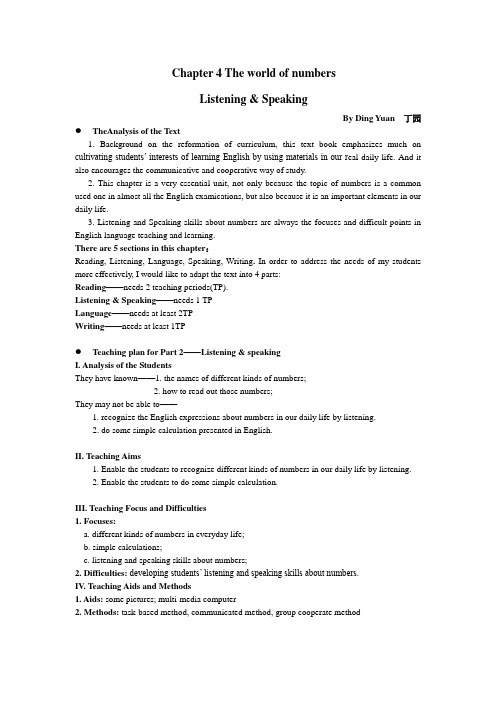
Chapter 4 The world of numbersListening & SpeakingBy Ding Yuan 丁园●TheAnalysis of the Text1. Background on the reformation of curriculum, this text book emphasizes much on cultivating students’ interests of learning English by using materials in our r eal daily life. And it also encourages the communicative and cooperative way of study.2. This chapter is a very essential unit, not only because the topic of numbers is a common used one in almost all the English examications, but also because it is an important elements in our daily life.3. Listening and Speaking skills about numbers are always the focuses and difficult points in English language teaching and learning.There are 5 sections in this chapter:Reading, Listening, Language, Speaking, Writing. In order to address the needs of my students more effectively, I would like to adapt the text into 4 parts:Reading——needs 2 teaching periods(TP).Listening & Speaking——needs 1 TPLanguage——needs at least 2TPWriting——needs at least 1TP●Teaching plan for Part 2——Listening & speakingI. Analysis of the StudentsThey have known——1. the names of different kinds of numbers;2. how to read out those numbers;They may not be able to——1. recognize the English expressions about numbers in our daily life by listening.2. do some simple calculation presented in English.II. Teaching Aims1. Enable the students to recognize different kinds of numbers in our daily life by listening.2. Enable the students to do some simple calculation.III. Teaching Focus and Difficulties1.Focuses:a. different kinds of numbers in everyday life;b. simple calculations;c. listening and speaking skills about numbers;2. Difficulties: developing students’ listening and speaking skills about numbers.IV. Teaching Aids and Methods1. Aids: some pictures; multi-media computer2. Methods: task-based method, communicated method, group cooperate method。
牛津深圳版英语七年级上册unit 4(4)教案

果
评
价
与
反
思
学生主体活动
教师活动
设计 意图
时间
分配
第二环节 观察操作、探索归纳平移的作法
StepI: Prepare for the listening and speaking
Step II: Do the listening
StepⅢ.Speaking
1. learn to write the twelve months and try to remember them quickly
课题
Unit4 The four seasons
课型
Listening and Speaking
备课时间
1 period标
1.Let students master the twelve months ,and know which seasons they belong to
2. can talk freely with his friends about seasons and what they can do in different seasons
1.show a p pt and let students to know the expr essions of the twelve months, lead them to read them loudly and spell them ,
2. play the listening materials , stop when necessary
To train the students’ ability of catching the information of the listening materials
牛津深圳版七年级英语上册Module4_Unit8第4课时听说课件AUqnwA

课后拓展
一、阅读理解。 Mr Brown has a clothes store, but he doesn’t go to the store very often. His sister
works in this store for him. One day, Mr Brown came to the store. There was only a young man sitting on the sofa,
一分耕耘一分收获
I’m Anna. I like travelling and collecting photos in my free time. I began to travel all over the world at the age of eight. Every time I go for a trip, I take some photos. Now I have hundreds of photos. Some photos are about the scenery; some photos are about people. The photos bring me lots of sweet memories. They can also show different cultures of different places.
A.Mr Brown often goes to the clothes store.
B.The young man is a very lazyhe young man worked in his shop.
D.The young girl is Mr. Brown’s girlfriend.
When his sister and a young woman came out of the fitting room, Mr. Brown asked his sister,“Why do you have that young man here? He doesn’t work at all.”
牛津译林版英语七年级英语上册unit4重点知识汇总

牛津译林版英语七年级英语上册unit 4 要点知识整理汇总一.短语1. wake up 醒来2. wake sb. up叫醒某人3. Its time for sth.It ’ s time (for sb.) to do sth是.(某人)干某事的时候了4. go walking in the hills 去山上漫步5. seldom go out 极少出门6. need a good rest 需要好好歇息=need to have a good rest7. need to do sth. 需要做某事8. write to her online friend 写信给她的网友9. do morning exercises 做晨操10. do eye exercises 做眼保健操11. do some exercise 锻炼12. have lessons 上课13. start (begin) lessons 开始上课14. do after-school activities 做课外活动15.be never late for work / school上班 / 上学从不迟到16.one of.. .之一。
后接可数名词复数17. be all nice to sb. 都对某人很好18. chat with sb. 和某人聊天19. chat with each other 相互聊天20. help each other 相互帮助play in the playground 在操场上玩be in the school volleyball team是校排球队成员=be a member of the school volleyball team23. practise after school放学后训练practise doing sth.练习/ 训练做某事24. on Wednesday afternoon在周三下午have a good time doing sth=have fun doing sth.做某事过得快乐26. in spring / summer / autumn / winter27. at 6 years old 在六岁 =at 6=at the age of 628. all the best 全部顺利,万事如意29.have much time to do sth. 有好多时间做某事30.have no time to do sth. 没有时间做某事31. go to her dancing lessons 去上舞蹈课32. dance for half an hour 跳舞半小时33. go roller skating 去溜旱冰34. go walking 去漫步35.between...and... 在...和...之间36. visit a museum 观光博物馆37.go on picnics with my family twice a month 一个月两次和我家人去野餐38. at noon 在正午39. at night 在夜里40. at work 在工作42.be bad for sb. 有 ..害43. help sb. get ready for sth 帮助某人为 ...做好准备44.get ready to do sth 准备好做某事 =be ready to do sth.45. learn a lot about sth 对于某事认识好多46. learn more about sth. 对于某事认识更多47. too much homework 太多作业48. too many lessons 太多课49. much too cold (hot)太冷(热)二.句子:1.Some dogs just don ’ t know how to have有些fun狗.就是不知道如何玩乐。
牛津上海英语七年级上册 Unit4 Listening and speaking (共26张PPT)

Look , think and say
Name
Mrs Wang
Job
doctor
Work place Children’s Hospital near Water Bay
Things to do look after sick children make sick children better
Unit4 Jobs people do Listening and speaking: Jobs and uniforms
Vicky Xu
Look, think and say
a postman in a post office
/ /
12
/ /
Look, think and say
Look, think and say
a doctor in a hospital make sick people better
a policeman in a police station help make the city a safe place
Look and learn
/ /
Say and act
/ /
Show Time
Name
Job
Work place
Susan secretary an office in the city centre
Things to do
Uniform? No
Like her job?
(interesting and enjoy working with all the people in the office)
What does she do there?
牛津深圳版英语七年级上册unit 4(4)教案
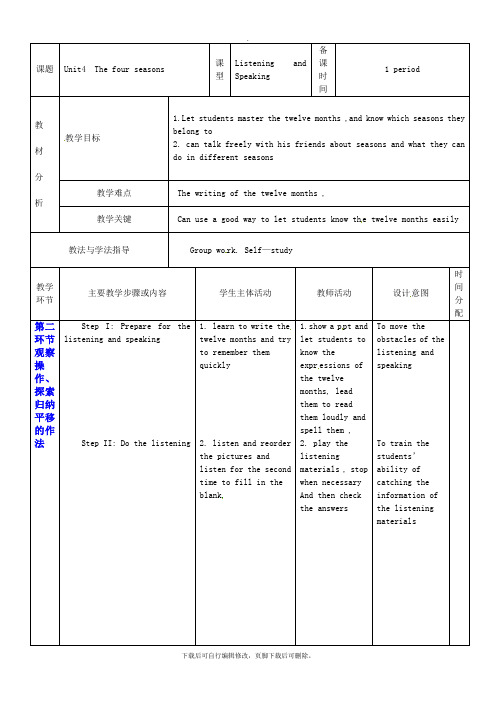
课题Unit4 The four seasons 课型Listening andSpeaking备课时间1 period教材分析教学目标1.Let students master the twelve months ,and know which seasons theybelong to2. can talk freely with his friends about seasons and what they cando in different seasons教学难点 The writing of the twelve months ,教学关键 Can use a good way to let students know th e twelve months easily 教法与学法指导Group wo rk. Self—study教学环节主要教学步骤或内容学生主体活动教师活动设计意图时间分配第二环节观察操作、探索归纳平移的作法Step I: Prepare for thelistening and speakingStep II: Do the listening1. learn to write thetwelve months and tryto remember themquickly2. listen and reorderthe pictures andlisten for the secondtime to fill in theblank1.show a p pt andlet students toknow theexpr essions ofthe twelvemonths, leadthem to readthem loudly andspell them ,2. play thelisteningmaterials , stopwhen necessaryAnd then checkthe answersTo move theobstacles of thelistening andspeakingTo train thestudents’ability ofcatching theinformation ofthe listeningmaterialsStepⅢ.Speaking 3. Describe the fourpictures of differentseasons .4.Talk in pairs whatis the weather likein Canberra and whatdo they do indifferent seasons 3.Lead thestudents todescribe thephotos.4.Set an exampleto make adialogue.3.To develop thestudents’ability oflistening andspeaking.4.To provide achance for thepartner tocooperate andcreate.第三环节课堂练习StepⅤ:Make notes aboutthe listening.5.Write down the keywords you get in thelistening part.5.Tell them tofind the keywords.5.To help thestudentsdevelop someways oflistening.第四环节课时小结StepⅥ;Summerize 6.List out theadj.words which candescribe the seasons6.Limt the timefor them tolist.6.Help them tocultivate theability ofsummarizing.第五环节课后作业 Make a dialogue in written way to describe the weather in your hometown and what do you like to do in differe nt seasons课堂教Prepare for listening → Listening →Speaking→summary 学流程效果评价与反思。
Unit4语法课件2024-2025学年沪教牛津版七年级英语上册
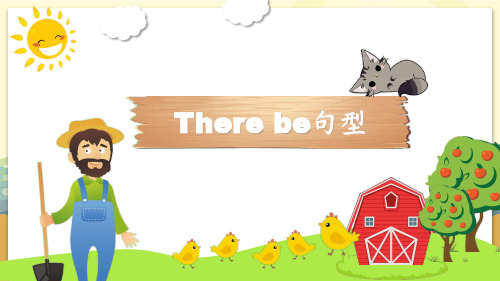
a any
on pencil
des k
the is
?
and
Is
ther
a pencil
and
e
an rulers
o
y
n
des the k
?
There be句型
There be句型的一般疑问句的回答:
Is there a ruler and a pen on the desk?
Yes, there is.
There are some apples on the tree. There are some books on the desk.
2 结构
肯定句:There are some pencils in my schoolbag. 一般疑问句:Are there any pencils in your schoolbag?
6. There ______________ a dog, two cats and some cows on the farm.
? 7. There ______________ any cats in the room.
Guessing game 猜猜我的农场有什么?
Game rules:
一个学生到前面来,背对屏幕, 用Is there...?/Are there...?提问, 其他学生看着屏幕回答!
2. There are some pigs in the sky.(变一般疑问句) Are there any pigs in the sky?
2 结构
特殊疑问句:(一般用来提问数量) How many books are there in my schoolbag? How much water is there in my schoolbag?
牛津译林版英语七年级上册第四单元重点知识梳理
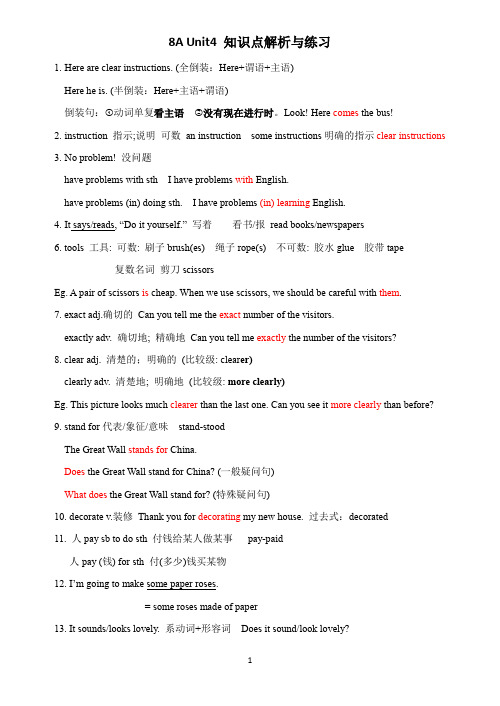
8A Unit4 知识点解析与练习1.Here are clear instructions. (全倒装:Here+谓语+主语)Here he is. (半倒装:Here+主语+谓语)倒装句:①动词单复看主语②没有现在进行时。
Look! Here comes the bus!2.instruction 指示;说明可数an instruction some instructions明确的指示clear instructions3.No problem! 没问题have problems with sth I have problems with English.have problems (in) doing sth. I have problems (in) learning English.4.It says/reads, “Do it yourself.”写着看书/报read books/newspapers6. tools 工具: 可数: 刷子brush(es) 绳子rope(s) 不可数: 胶水glue 胶带tape复数名词剪刀scissorsEg. A pair of scissors is cheap. When we use scissors, we should be careful with them.7. exact adj.确切的Can you tell me the exact number of the visitors.exactly adv. 确切地; 精确地Can you tell me exactly the number of the visitors?8. clear adj. 清楚的;明确的(比较级: clear er)clearly adv. 清楚地; 明确地(比较级: more clearly)Eg. This picture looks much clearer than the last one. Can you see it more clearly than before?9. stand for代表/象征/意味stand-stoodThe Great Wall stands for China.Does the Great Wall stand for China? (一般疑问句)What does the Great Wall stand for? (特殊疑问句)10. decorate v.装修Thank you for decorating my new house. 过去式:decorated11. 人pay sb to do sth 付钱给某人做某事pay-paid人pay (钱) for sth 付(多少)钱买某物12. I’m going to make some paper roses.= some roses made of paper13. It sounds/looks lovely. 系动词+形容词Does it sound/look lovely?14. 行为动词need:(1)need sth (2)need to do sth (3)need sb to do sth (4)need ...for sth情态动词need:needn’t do sth 不必Eg. You don’t need to do exercise every day. = You needn’t do exercise every day.15. be crazy about sb./sth./doing sth. 对…着迷crazy-crazier- the craziestEg. My mother is crazy (痴迷的) about making paper roses in my family.16. finish sth./ doing sth. 结束某事17. terrible adj. 可怕的That sounds/looks terrible.terrible-terribly adv. 可怕地;非常,极度地Eg. Be terribly ill/hurt I’m terribly sorry for being late.18. try to do sth. 努力/试图/设法做某事try not to do sth. 尽量不要做某事19. put in sth. 安装(门,窗,灯, 淋浴器...)put -putting put - put(过去式)put up 张贴,悬挂,举起,搭建put up a notice/a poster/a picture/ your hands/ a tent/ a shelf put out 扑灭put on 穿上;戴上put away 收起来,整理好put off 推迟Eg. 在他安装了一盏更亮的灯之后,他的整座房子停电了。
- 1、下载文档前请自行甄别文档内容的完整性,平台不提供额外的编辑、内容补充、找答案等附加服务。
- 2、"仅部分预览"的文档,不可在线预览部分如存在完整性等问题,可反馈申请退款(可完整预览的文档不适用该条件!)。
- 3、如文档侵犯您的权益,请联系客服反馈,我们会尽快为您处理(人工客服工作时间:9:00-18:30)。
返回目录
Unit 4
Seasons
(B)
What does Tom like doing on that day? A.Visit the science museum. B.Play a ball game. C.Go to a nearby park.
返回目录
Unit 4
Seasons
They often go to the farm to help with the farmers. In winter, it’s very cold. And sometimes it’s snowy and windy. Summer is his favourite season because he likes swimming.
返回目录
Unit 4
二、信息获取。
Seasons
第一节 听选信息
听三段对话,每段播放两遍。各段播放前你有10秒钟的阅题时间。 各段播放后有两个问题。请根据所听到的问题选择正确的答案。
听第一段对话,回答第 1–2 两个问题。现在你有 10 秒钟的 阅题时间。
返回目录
Unit 4
Seasons
( B ) Which season does the woman like best?
Unit 4 Seasons
第4课时——听说
Unit 4
Seasons
一、模仿朗读。 听以下短文一遍,给你 50 秒钟的时间准备,然后模仿朗读。
当听见“开始录音”的信号后,立即在 50 秒钟内朗读短文,当听到 要求“停止录音”的信号时,应立即中止朗读。
返回目录
Unit 4
Seasons
I like summer best. It’s very cool in my hometown, and it’s nice to have a long and sunny summer. There are a lot of outdoor activities I can take part in, such as going camping. And also, I can go swimming in summer. It has a lot of fun. My least favourite season is winter, because it’s pretty cold, and I do not want to go outside.
返回目录
Unit 4
Seasons
听第二段对话,回答第3–4两个问题。现在你有10秒钟的阅题 时间。
(C)
Which season makes the woman feel nice? A.Spring. B.Summer. C.Autumn.
返回目录
Unit 4
Seasons
(A )
What does the man enjoy doing in summer? A.Swimming. B.Taking a trip. C.Watching TV.
A.On June 1. B.On May 5. C.On August 15.
返回目录
Unit 4
Seasons
( B ) How do the children feel on that day?
A.Sad. B.Happy. C.Amazed.
返回目录
Unit 4
Seasons
( C ) What does Lily do on that day?
返回目录
Unit 4
Seasons
听第三段对话,回答第5–6两个问题。现在你有10秒钟的阅题 时间。
( C)
What season is it now in the woman’s hometown? A.Spring. B.Winter. C.Summer.
返回目录
Unit 4
Seasons
(C )
返回目录
Unit 4
三、信息转述及询问。
Seasons
第一节 信息转述
请根据所听到的内容,记录思维导图提示的信息,完成转述。 现在,你有15秒钟的时间阅读思维导图。
返回目录
Unit 4
Seasons
下面你有 50 秒时间准备。你的转述可以这样开始:Bill comes from America…
A.Spring. B.Winter. C.Autumn.
返回目录
Unit 4
Seasons
( C)
Why does the man like spring best? A.He likes warm weather. B.He wants to go camping. C.He can take a trip.
Bill comes from America, but he lives in Beijing now. Now he is telling you something about the weather in Beijing. In spring, it is very short and warm. In summer, it’s very hot, but it often rains. They often go swimming in the river. In autumn, the weather is very dry and cool.
返回目录
Unit 4
第二节 询问信息
Seasons
你希望了解更多关于 Bill 在北京的情况,请根据以下提示向 他提两个问题。
请你准备第一个问题。 你在春天喜干什么?
What do you like doing in spring, Bill?
返回目录
Unit 4
Where does the woman come from? A.China. B.America. C.Australia.
返回目录
Unit 4
Seasons
第二节 回答问题
听下面一段短文,请根据所听内容回答第7–10四个问题。现 在你有15秒钟的阅题时间。
( B ) When is Children’s Day in Japan?
